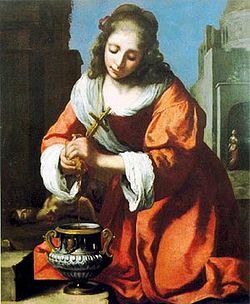
Feastday: July 21
Praxedes according to her legend was a Roman maiden, the sister of St. Pudentiana, who, when the Emperor Marcus Antoninus was hunting down Christians, sought them out to relieve them with money, care, comfort and every charitable aid. Some she hid in her house, others she encouraged to keep firm in the faith, and of yet others she buried the bodies; and she allowed those who were in prison or toiling in slavery to lack nothing. At last, being unable any longer to bear the cruelties inflicted on Christians, she prayed to God that, if it were expedient for her to die, she might be released from beholding such sufferings. And so on July 21 she was called to the reward of her goodness in Heaven. Her body was laid by the priest Pastor in the tomb of her father, Pudens, and her siser Pudentiana, which was in the cemetery of Priscilla on the Salarian Way. This saint was certainly buried in the catacomb of Priscilla, near to St. Pudentiana. But that she was the sister of that saint, or that either of them was the daughter (as later legends say) of a Roman senator, Pudens, converted by St. Peter, there is no reason to believe. She was at first venerated as a martyr in connection with the ECCLESIA PUDENTIANA, but afterwards a separate church was built in her honour, on the alleged site of her house, to which, when it was rebuilt by Pope St. Paschal I (the present Santa Prassede), her relics were taken.
Free Online Catholic Classes for Anyone, Anywhere
All Free Classes Live Lessons Catholic Knowledge Quiz Confession Classes Bible Classes Catechism Classes Grade 1 Grade 2 Grade 3 Grade 4 Grade 5 Grade 6 Grade 7 Grade 8 High School Rosary Classes Way of ChristSecond century Christian saint "Praxedis" redirects here. For the minor planet, see 547 Praxedis. For the town in Mexico, see Práxedis G. Guerrero, Chihuahua. "Santa Praxedes" redirects here. For the municipality in the Philippines, see Santa Praxedes, Cagayan. For the Mother General of the Sisters of Loretto, see Mother Praxedes Carty.
Saint Práxedes is a traditional Christian saint of the 2nd century. Her name is sometimes rendered as Praxedis (Πραξηδίς) or Praxed.
Biography
Little is known about Práxedes, and not all accounts agree. According to Jacobus de Voragine's The Golden Legend, Práxedes was the sister of Saint Pudentiana; their brothers were Saint Donatus and Saint Timothy. During one of the periods of persecution, they buried the bodies of Christians and distributed goods to the poor. De Voragine's brief account states they died in 165, "in the reign of Emperors Marcus and Antoninus II."
Sabine Baring-Gould, in the entry for Saint Novatus, states that the "holy virgin" Práxedes was a daughter of Saint Pudens, sister of Saint Pudentiana, and that her brothers were Saint Novatus and Saint Timothy. Novatus is said to have died in 151.
Burial sites
The remains of Práxedes and Pudentiana were buried in the Catacomb of Priscilla, nicknamed the "Queen of the Catacombs" for its many martyrs and popes. Later, they became associated with a Roman church, Titulus Pudentis, which is presumably named for their father, Saint Pudens, and was also known as the Ecclesia Pudentiana. (This association may have led to Potentiana coming to be known as Pudentiana.) According to the Catholic Encyclopedia, "The two female figures offering their crowns to Christ in the mosaic of the apse in St. Pudentiana are probably Potentiana and Práxedes."
In the 4th century, a Titulus Praxedis church was being built, especially connected with the veneration of Saint Praxedis. The relics of Práxedes and her sister were translated to that church, which was rebuilt by Pope Paschal I (817–824), and renamed Santa Prassede.
Namesakes
People
- Práxedes Fajardo, Philippine revolutionary
- Práxedes Mateo Sagasta (born on her feast day)
- Práxedis Guerrero
- Praxède Larue
Places
- Santa Prassede church in Rome
- Práxedis G. Guerrero, Chihuahua
- Santa Praxedes, Cagayan
- Sainte-Praxède, Quebec
Notes
- ^ Antoninus Pius ruled from 138 to 161; Marcus Aurelius from 161 on. Catholic Online has "Marcus Antoninus" (that is, Marcus Aurelius (whose full name is sometimes given as "Marcus Aurelius Antoninus Severus") but offers no source for its identification.





